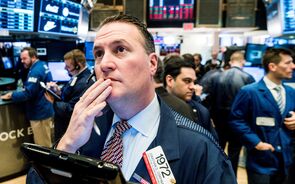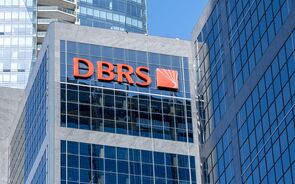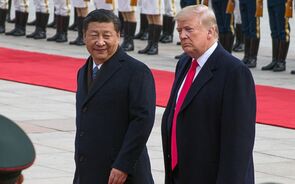Task- "Market Pulls a U-Turn on Russian Rumor"
2 mensagens
|Página 1 de 1
Task- "Market Pulls a U-Turn on Russian Rumor"
Deixo aqui mais um excelente artigo do Task sobre o resumo da sessão de hoje e algumas visões do mercado. Os jornalistas lusos deviam ler com atenção estes artigos, pois penso que é um exemplo de qualidade na forma como falar do mercado. Eu, pelo menos, aprecio muito.
Ulisses
"Market Pulls a U-Turn on Russian Rumor"
By Aaron L. Task
Senior Writer
02/25/2003 06:08 PM EST
"Turns out the only thing better for stocks than the outbreak of war is the possibility of peace. Major averages rebounded from some sharp early losses Tuesday amid rumors Russia had brokered a disarmament agreement with Iraq.
After trading as low as 7719.64 at about 10:30 a.m. EST, the Dow Jones Industrial Average rose steadily to close up 0.7% to 7909.50. Following similar patterns, the S&P 500 closed up 0.7% to 838.57 after trading as low as 818.54, while the Nasdaq Composite gained 0.5% to 1328.98 vs. its nadir of 1292.
Maybe traders were just looking for an excuse to rally -- or things had gotten overdone to the downside -- but the unsubstantiated Russia rumor did coincide with a rebound and some short-covering, which became a self-replicating cycle.
"I didn't see anything that justified the market rallying 190 [Dow] points off its low, but then again I'm not sure why we were down 140 points either," quipped Scott Curtis, head of U.S. equity trading at Credit Lyonnais. "The story is still the same."
That said, Secretary of Energy Spencer Abraham's comments that the U.S. would release its strategic petroleum reserve in the event of a supply disruption in the Middle East did aid stocks as it took some starch out of the oil market, Curtis said. Crude futures closed down 1.2% to $36.06 per barrel after trading as high as $37.10 intraday.
The trader also observed some participants "throwing in the towel" in the early going, a positive contrarian signal. The CBOE's put/call ratio traded as high as 1.27 before ending at 0.70.
The earlier rise in bearishness -- however fleeting -- reflected a grim morning on the geopolitical front, highlighted by Saddam Hussein's refusal to destroy banned al-Samoud 2 missiles, as per a CBS interview scheduled for broadcast Wednesday night, and North Korea's test-firing a long-range missile just hours before the inauguration of South Korea's new President Roh Moo-hyun.
"Secretary of State Colin Powell, in South Korea for the inauguration, called the missile test unsurprising and "fairly innocuous." But Asian financial markets tumbled in reaction, setting the stage for a weak opening in New York.
The early weakness in U.S. stocks accelerated after the 10 a.m. release of the Conference Board's consumer confidence report, which fell to a nine-year low of 64 in February vs. expectations for a far more modest drop to 77. A 3% rise in January existing home sales to a record 6.09 million units did little to stem the early decline. (The S&P Homebuilding Index did rise 2.3%, further aided by strong earnings from Toll Brothers (TOL:NYSE - news - commentary - research - analysis).)
As stocks wobbled in the early going, the Treasury market soared. The price of the 10-year Treasury traded as high as 100 19/32, before retreating some as stocks recovered in the afternoon. The benchmark note closed up 6/32 to 100 14/32, its yield falling to 3.82% after briefly breaching 3.80% earlier. At the short end of the curve, the two-year note's yield fell to as low as 1.51% intraday -- its lowest level since it was introduced in the 1970s -- before closing at 1.54%.
Geopolitics and peace rumors notwithstanding, perhaps the intraday reversal was a function of Treasury yields getting down to levels at which asset allocators felt compelled to shift money out of fixed-income and into shares. As Union Tree Capital's Scott Reamer observed in RealMoney.com's Columnist Conversation, there were reports of some hedge funds selling Treasuries and buying stocks at midday.
There was a large order for 1,200 S&P 500 futures contracts when the futures were trading at 829.50 at about 2 p.m. EST, noted Fari Hamzei, president of Hamzei Analytics. "We never looked back," after that trade, Hamzei said, suggesting "local" traders at the Chicago Mercantile Exchange who were short previously were forced to cover. Short-sellers generally cover positions by buying the underlying security they are short, producing higher prices and more covering still.
Credit Lyonnais' Curtis agreed that "a lot of the activity lately has been intramarket vs. regular stock" activity. In other words, the futures and options activity is having a greater influence on the cash market, which isn't surprising given the increasing dominance of institutional and hedge fund participants vs. retail investors.
Computerized program trading is currently accounting for about 36% of New York Stock Exchange volume this year, up from last year's record 32%, said Curtis, who noted overall activity Tuesday was higher than recent levels.
Nearly 1.5 billion shares were exchanged on the Big Board, one of just a handful of sessions this year in which activity has topped 2002's average daily volume of about 1.45 billion shares. A hair under 1.2 billion shares traded over the counter, and breadth modestly favored advancing stocks on both exchanges.
Parting Short, Part I
Much of the coverage of the aforementioned consumer confidence report was that "war fears" were the main contributor to the drop. Given that Federal Reserve Chairman Alan Greenspan has attributed everything that's wrong with the economy to geopolitical concerns (certainly nothing the Fed's done during his tenure), it's entirely understandable why journalists and economists reached that conclusion.
But the 'war fears' rationale is "vastly overblown," according to Jim Bianco, president of Bianco Research in Chicago, who offered an alternative theory (as is his wont).
"The Conference Board acknowledged the stock market had a lousy January," Bianco said, noting consumer confidence has been highly correlated to the S&P 500 in the past five years. "All they've announced to us is the public acknowledging the stock market went down," or that mutual fund investors opened their final statements for 2002 and reacted on a third down year.
Yes, the bubble popped long ago, but the effects of the 1990's mania linger in ways big and small.
Parting Short, Part IILost in the shuffle of Tuesday's rebound was the Dow Jones Transportation Average violating its October lows of around 2008. The transports closed up 1.2% to 2041.83, but only after trading as low as 1973.63 early on.
As discussed last night, the question now is whether the Dow Industrials will "confirm" the Transports violation of the October lows. Dow Theory maven Richard Russell believes that's very likely to occur, suggesting any excitement about Tuesday's turnaround will prove short-lived. "
(in www.realmoney.com)
Ulisses
"Market Pulls a U-Turn on Russian Rumor"
By Aaron L. Task
Senior Writer
02/25/2003 06:08 PM EST
"Turns out the only thing better for stocks than the outbreak of war is the possibility of peace. Major averages rebounded from some sharp early losses Tuesday amid rumors Russia had brokered a disarmament agreement with Iraq.
After trading as low as 7719.64 at about 10:30 a.m. EST, the Dow Jones Industrial Average rose steadily to close up 0.7% to 7909.50. Following similar patterns, the S&P 500 closed up 0.7% to 838.57 after trading as low as 818.54, while the Nasdaq Composite gained 0.5% to 1328.98 vs. its nadir of 1292.
Maybe traders were just looking for an excuse to rally -- or things had gotten overdone to the downside -- but the unsubstantiated Russia rumor did coincide with a rebound and some short-covering, which became a self-replicating cycle.
"I didn't see anything that justified the market rallying 190 [Dow] points off its low, but then again I'm not sure why we were down 140 points either," quipped Scott Curtis, head of U.S. equity trading at Credit Lyonnais. "The story is still the same."
That said, Secretary of Energy Spencer Abraham's comments that the U.S. would release its strategic petroleum reserve in the event of a supply disruption in the Middle East did aid stocks as it took some starch out of the oil market, Curtis said. Crude futures closed down 1.2% to $36.06 per barrel after trading as high as $37.10 intraday.
The trader also observed some participants "throwing in the towel" in the early going, a positive contrarian signal. The CBOE's put/call ratio traded as high as 1.27 before ending at 0.70.
The earlier rise in bearishness -- however fleeting -- reflected a grim morning on the geopolitical front, highlighted by Saddam Hussein's refusal to destroy banned al-Samoud 2 missiles, as per a CBS interview scheduled for broadcast Wednesday night, and North Korea's test-firing a long-range missile just hours before the inauguration of South Korea's new President Roh Moo-hyun.
"Secretary of State Colin Powell, in South Korea for the inauguration, called the missile test unsurprising and "fairly innocuous." But Asian financial markets tumbled in reaction, setting the stage for a weak opening in New York.
The early weakness in U.S. stocks accelerated after the 10 a.m. release of the Conference Board's consumer confidence report, which fell to a nine-year low of 64 in February vs. expectations for a far more modest drop to 77. A 3% rise in January existing home sales to a record 6.09 million units did little to stem the early decline. (The S&P Homebuilding Index did rise 2.3%, further aided by strong earnings from Toll Brothers (TOL:NYSE - news - commentary - research - analysis).)
As stocks wobbled in the early going, the Treasury market soared. The price of the 10-year Treasury traded as high as 100 19/32, before retreating some as stocks recovered in the afternoon. The benchmark note closed up 6/32 to 100 14/32, its yield falling to 3.82% after briefly breaching 3.80% earlier. At the short end of the curve, the two-year note's yield fell to as low as 1.51% intraday -- its lowest level since it was introduced in the 1970s -- before closing at 1.54%.
Geopolitics and peace rumors notwithstanding, perhaps the intraday reversal was a function of Treasury yields getting down to levels at which asset allocators felt compelled to shift money out of fixed-income and into shares. As Union Tree Capital's Scott Reamer observed in RealMoney.com's Columnist Conversation, there were reports of some hedge funds selling Treasuries and buying stocks at midday.
There was a large order for 1,200 S&P 500 futures contracts when the futures were trading at 829.50 at about 2 p.m. EST, noted Fari Hamzei, president of Hamzei Analytics. "We never looked back," after that trade, Hamzei said, suggesting "local" traders at the Chicago Mercantile Exchange who were short previously were forced to cover. Short-sellers generally cover positions by buying the underlying security they are short, producing higher prices and more covering still.
Credit Lyonnais' Curtis agreed that "a lot of the activity lately has been intramarket vs. regular stock" activity. In other words, the futures and options activity is having a greater influence on the cash market, which isn't surprising given the increasing dominance of institutional and hedge fund participants vs. retail investors.
Computerized program trading is currently accounting for about 36% of New York Stock Exchange volume this year, up from last year's record 32%, said Curtis, who noted overall activity Tuesday was higher than recent levels.
Nearly 1.5 billion shares were exchanged on the Big Board, one of just a handful of sessions this year in which activity has topped 2002's average daily volume of about 1.45 billion shares. A hair under 1.2 billion shares traded over the counter, and breadth modestly favored advancing stocks on both exchanges.
Parting Short, Part I
Much of the coverage of the aforementioned consumer confidence report was that "war fears" were the main contributor to the drop. Given that Federal Reserve Chairman Alan Greenspan has attributed everything that's wrong with the economy to geopolitical concerns (certainly nothing the Fed's done during his tenure), it's entirely understandable why journalists and economists reached that conclusion.
But the 'war fears' rationale is "vastly overblown," according to Jim Bianco, president of Bianco Research in Chicago, who offered an alternative theory (as is his wont).
"The Conference Board acknowledged the stock market had a lousy January," Bianco said, noting consumer confidence has been highly correlated to the S&P 500 in the past five years. "All they've announced to us is the public acknowledging the stock market went down," or that mutual fund investors opened their final statements for 2002 and reacted on a third down year.
Yes, the bubble popped long ago, but the effects of the 1990's mania linger in ways big and small.
Parting Short, Part IILost in the shuffle of Tuesday's rebound was the Dow Jones Transportation Average violating its October lows of around 2008. The transports closed up 1.2% to 2041.83, but only after trading as low as 1973.63 early on.
As discussed last night, the question now is whether the Dow Industrials will "confirm" the Transports violation of the October lows. Dow Theory maven Richard Russell believes that's very likely to occur, suggesting any excitement about Tuesday's turnaround will prove short-lived. "
(in www.realmoney.com)
2 mensagens
|Página 1 de 1
Quem está ligado:
Utilizadores a ver este Fórum: CC-5, Google [Bot], Nightrader, Shimazaki_2, VALHALLA e 41 visitantes



